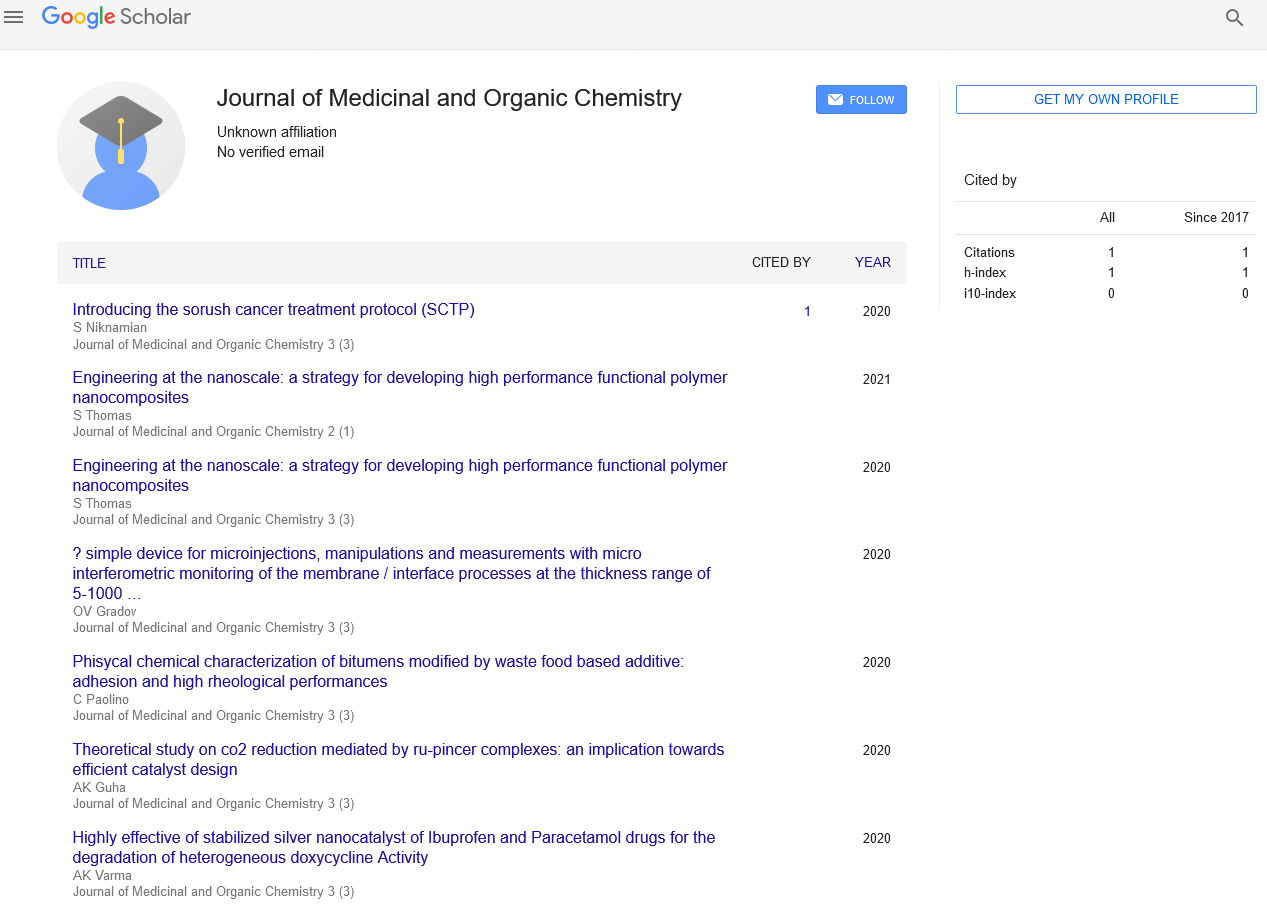Perspective - Journal of Medicinal and Organic Chemistry (2024) Volume 7, Issue 2
Exploring the Depths of Human Experience: The Significance of Psychosocial Research
- Corresponding Author:
- Yuta Kawami
Department of Health Science,
Ankita University,
Tokyo,
Japan
E-mail: yutakawami@iuhw.ac.jp
Received: 07-Mar-2024, Manuscript No. jmoc-24-129075; Editor assigned: 12-Mar-2024, PreQC No. jmoc-24-129075 (PQ); Reviewed: 26-Mar-2024, QC No. jmoc-24-129075; Revised: 11-Apr-2024, Manuscript No. jmoc-24-129075 (R); Published: 18-Apr-2024, DOI: 10.37532/jmoc.2024.7(2).187-188
Introduction
Psychosocial research delves into the intricate interplay between psychological processes and social factors, shedding light on the complexities of human behavior, emotions, and relationships. Rooted in the disciplines of psychology and sociology, psychosocial research explores the dynamic interactions between individuals and their social environments, offering insights into the factors shaping mental health, well-being, and resilience. In this comprehensive exploration of psychosocial research, we delve into its multifaceted domains, methodologies, and applications, illuminating its significance in understanding and addressing the challenges of contemporary society.
Description
Understanding the psyche: Psychology and social contexts
Psychology, the scientific study of the mind and behavior, provides a foundation for psychosocial research by examining the cognitive, emotional, and behavioral processes underlying human experience. From personality traits and cognitive biases to emotional regulation and social cognition, psychology offers valuable insights into the individual-level factors shaping mental health and well-being.
However, human behavior is not solely determined by internal factors; it is also profoundly influenced by social contexts, cultural norms, and interpersonal relationships. Sociology, the study of society and social interactions, complements psychology by examining the broader social, cultural, and structural factors that shape individuals’ experiences and behaviors. By integrating psychological and sociological perspectives, psychosocial research bridges the gap between the individual and the social environment, elucidating the intricate connections between mental health and social dynamics.
Domains of psychosocial research: From identity to resilience
Psychosocial research encompasses a diverse array of domains, each offering unique insights into the complexities of human experience and behavior. Identity formation, for example, explores how individuals develop a sense of self and belonging within various social contexts, encompassing factors such as gender identity, sexual orientation, ethnicity, and cultural heritage. Social relationships and support networks play a crucial role in shaping mental health and wellbeing, influencing individuals’ sense of belonging, self-esteem, and emotional resilience. Research on attachment theory, social support, and interpersonal relationships elucidates the impact of social connections on psychological functioning and coping mechanisms in the face of stress and adversity.
Moreover, psychosocial research examines the mechanisms of resilience-the capacity to adapt and thrive in the face of adversity and the protective factors that foster resilience in individuals and communities. By understanding the pathways to resilience, researchers can develop interventions and strategies to promote mental health and well-being, even in challenging circumstances.
Methodologies in psychosocial research: Bridging quantitative and qualitative approaches
Psychosocial research employs a diverse range of methodologies to investigate complex phenomena, drawing on both quantitative and qualitative approaches to capture the richness and nuance of human experience. Quantitative methods, such as surveys, experiments, and statistical analyses, allow researchers to quantify relationships between variables, identify patterns, and test hypotheses systematically. Qualitative methods, including interviews, focus groups, and ethnographic observation, provide a deeper understanding of individuals’ lived experiences, perspectives, and social contexts. By capturing the subjective meaning and complexity of human behavior, qualitative research complements quantitative findings, offering insights into the nuances of social interactions, cultural practices, and identity formation.
Mixed methods research, which integrates quantitative and qualitative approaches, combines the strengths of both methodologies to provide a comprehensive understanding of psychosocial phenomena. By triangulating data sources and perspectives, mixed methods research enhances the validity and reliability of findings, offering a more nuanced understanding of human behavior and social dynamics.
Applications of psychosocial research: Informing policy and practice
Psychosocial research has far-reaching implications for informing policy development, clinical practice, and interventions aimed at promoting mental health and well-being. By identifying risk factors, protective factors, and mechanisms underlying mental health outcomes, psychosocial research informs the design and implementation of evidence-based interventions and prevention programs. In the field of mental health, psychosocial research informs the development of psychotherapeutic approaches, resiliencebuilding interventions, and communitybased support services tailored to the needs of diverse populations. From trauma-informed care to culturally sensitive interventions, psychosocial research guides clinicians and practitioners in providing compassionate and effective care for individuals experiencing psychological distress.
Furthermore, psychosocial research informs social policies and public health initiatives aimed at addressing systemic inequalities, promoting social justice, and fostering inclusive communities. By identifying social determinants of health, such as poverty, discrimination, and social isolation, psychosocial research advocates for policies that address structural barriers and promote equity and social cohesion.
Challenges and opportunities in psychosocial research
Despite its contributions to understanding human behavior and social dynamics, psychosocial research faces numerous challenges, including funding constraints, methodological limitations, and the complexity of studying subjective phenomena. Moreover, conducting ethical research that respects participants’ rights and diverse perspectives requires careful consideration and adherence to ethical guidelines and principles. However, psychosocial research also presents opportunities for interdisciplinary collaboration, innovation, and community engagement. By integrating diverse perspectives, methodologies, and stakeholders, psychosocial research can generate transformative insights and solutions to address pressing social and mental health challenges in today’s world.
Conclusion
In conclusion, psychosocial research offers a holistic understanding of human experience by examining the interplay between psychological processes and social contexts. From identity formation to resilience-building, psychosocial research sheds light on the factors shaping mental health and well-being, informing interventions, policies, and practices aimed at fostering individual and collective flourishing. As we navigate the complexities of contemporary society, let us embrace the insights and possibilities offered by psychosocial research to promote empathy, understanding, and social change.

